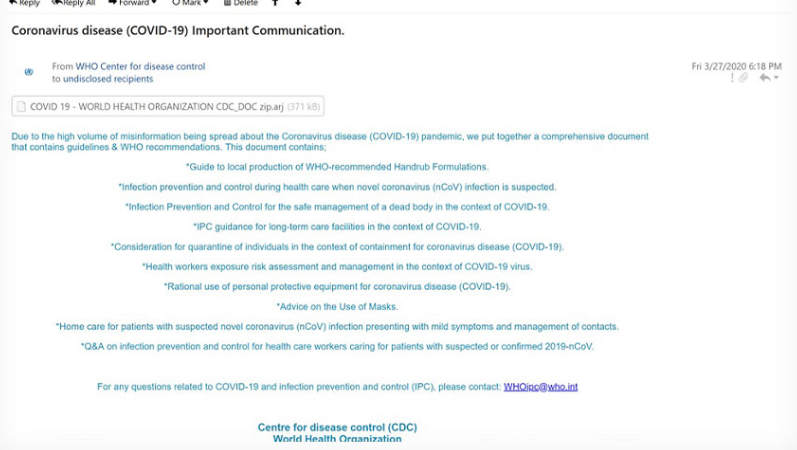HSBC Bank Covid-19 Update SCAM
What is HSBC Bank Covid-19 Update
HSBC Bank Covid-19 Update refers to a scam email that’s currently going around spreading malware. The sender of the email claims to be the HSBC bank, and the email asks that the receiver review the attached document because it contains important information related to HSBC’s response to the current global pandemic and the future. The file attached to the email is the Pony data-stealing malware, and it’s a serious infection.

The fact that the email is a spam and contains malware is fairly obvious. It’s written in an awkward way, is sent from a weird email address and is just generally suspicious. But unfortunately, users less familiar with spam and malicious emails may click on the attachment and end up infecting their computers with dangerous malware.
HSBC Bank Covid-19 Update is the subject of the email, which will immediately catch the attention of users, particularly if they are HSBC customers. It goes on to say that HSBC is putting “all resources together to provide key vital services to our utmost loyal customers and intending customers” during the currently ongoing COVID-19 pandemic. It’s clearly using people’s unease about the economic situation during this time to trick them into opening the attachment, which supposedly contains “intended rolled out plans to the year 2020 and ahead”.
If users were to open the attached file, they would end up downloading a malicious file, which if opened would initiate the Pony malware. Instead, what you should do is remove HSBC Bank Covid-19 Update email from your inbox. If you have opened the file, scan your computer with anti-malware software immediately to get rid of the malware.
What are signs of a spam or malicious email
It’s usually not difficult to differentiate between legitimate and spam/malicious emails, as long as you know what to look for. The first thing you should check in an email is the sender’s address. The email address sending these HSBC Bank Covid-19 Update scam emails very clearly does not belong to anyone working at that bank, even if it has HSBC in it. You can disregard any “official” emails that are sent from obviously random email addresses, like ones made up of random letters and numbers. And even if the email address seems legitimate, you should still make sure it belongs to who the sender claims to be. You can usually do that by researching via Google or some other search engine.
Official emails, such as ones sent by your bank, will never contain spelling or grammar mistakes. So if you spot any mistakes or awkward language, that could be sign that you’re dealing with spam. This particular HSBC Bank Covid-19 Update email is written an a weird way and it’s obvious it did not come from the actual bank.
How you’re addressed in the greeting can also tell a lot about the email. Spam and malicious emails usually address you as Sir/Madam, Customer, Users, Member, etc. However, if the bank you’re using were to send you an email, they would greet you with your name, not a generic greeting.
Finally, if an unsolicited email contains an attachment, you should scan it with anti-virus software or VirusTotal before opening. Never open email attachments sent by people you do not know because they could be malicious.
Opening the attached file could initiate the Pony malware
If you were to open the attached file, you would end up infecting your computer with Pony malware. Pony malware is a data-stealing trojan that will target your login credentials. It can collect data from all kinds of programs, including browsers. This malware stays in the background without showing any overly obvious symptoms, which means the malware could inhabit the computer for a long time.
If you are aware of how your computer normally behaves, you may notice some signs. Such as a suddenly slower computer, weird processes in Task Manager, and programs crashing for no reason. These are usually the first signs. However, having anti-malware software installed is still necessary because it’s the only way to be sure.
HSBC Bank Covid-19 Update removal
You can safely delete HSBC Bank Covid-19 Update email from your inbox. However, if you opened the attachment, you need to scan your computer with anti-malware software. You should also leave the anti-malware enabled from now on.
Site Disclaimer
WiperSoft.com is not sponsored, affiliated, linked to or owned by malware developers or distributors that are referred to in this article. The article does NOT endorse or promote malicious programs. The intention behind it is to present useful information that will help users to detect and eliminate malware from their computer by using WiperSoft and/or the manual removal guide.
The article should only be used for educational purposes. If you follow the instructions provided in the article, you agree to be bound by this disclaimer. We do not guarantee that the article will aid you in completely removing the malware from your PC. Malicious programs are constantly developing, which is why it is not always easy or possible to clean the computer by using only the manual removal guide.
